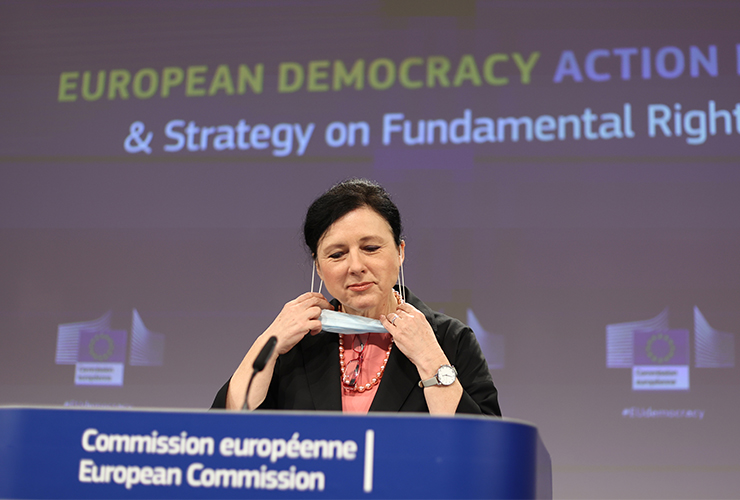Last week was not a positive one for media freedom in European Union. On Tuesday, February 9, a court in Budapest approved the decision of the government-controlled Hungarian Media Council to block the automatic extension of the broadcast license for the country’s last independent radio station, Klubrádió, dealing a damaging blow to what remains of media pluralism in the country. This week, the station was officially forced off the airwaves.
Days later, several independent media outlets in Poland suspended their news coverage on February 11 to protest a planned advertisement tax, which they fear will be yet another lever of pressure for the ruling Law and Justice (PiS) party to use in its long-running campaign to destabilize their businesses.
These recent events will have been on the minds of many during an online press briefing on Friday, February 12 with European Commission Vice-President Věra Jourová, a Czech politician who has been commissioner for values and transparency since 2019. During an event hosted by the Vienna-based Presseclub Concordia, she discussed the renewed threats to media freedom in Central Europe and outlined steps the EU is taking to address them.
A key mechanism for strengthening media freedom and pluralism in Europe, Jourová said, would be the European Democracy Action Plan (EDAP), which was published by the Commission in December last year. It focuses particularly on the threats female journalists face, the abusive use of Strategic Lawsuits Against Public Participation (SLAPPs), and ways to provide sustainable funding for journalism. “I think that we have made a horrible mistake in Europe by underestimating the role of media for upholding democracy”, Jourová said.
The commissioner stressed that another of the key instruments to protect media freedom in EU is the Rule of Law mechanism, which was approved by the European Council last December. The mechanism links access to EU funding to respect for fundamental democratic values. Jourová underlined the mechanism’s capacity for encouraging countries like Hungary and Poland to act according to the bloc’s principles. “The one who can’t understand the values, can understand the money”, she said.
To guarantee journalists the possibility to work without disturbance, the Commission is also preparing a legislative initiative to curb the increasing use of lawsuits against journalists, Jourova added. “It’s more and more the case that those who have the money and the influence have the chance to silence journalists by means of lawsuit”, she said. In November, IPI together with 87 other organizations and media freedom groups called for changes to EU law to combat vexatious lawsuits.
However, Jourová also acknowledged that EU faced practical challenges in trying to defend free media and stressed that the Commission needs more tools which are not based only on law. “We have to do much more to protect journalists also by means of European money”, she said. “Journalists must feel safe when doing their job.” The commissioner added that there needs to be more systematic approach in the member states themselves to ensuring the safety of journalists. As an example, Jourová mentioned Sweden and the Netherlands, which have already established specific measures and funds to protect journalists.
Jourová said those kinds of actions are especially needed now given the decline in media freedom in several member states. “How many murdered journalists do we need in Europe to take action?” she said, referring to the murders of Slovak journalist Ján Kuciak in 2018 and Maltese journalist Daphne Caruana Galizia in 2017. “What we see in Ján Kuciak case is that there were warnings before he was murdered. He was harassed online. There were signs that he is under serious threat”, she added.
According to Jourová, the EU is currently working to better collect cases of attacks on journalists. “We are mapping more and more the cases”, she said, and emphasized her concern over the rapid rise of attacks against journalists in the past years. Women journalists in particular have been especially targeted, she noted, saying that the EU needed to react to gender-based threats. According to a survey published last year by the Centre for Media Pluralism and Media Freedom, women are also underrepresented in the media, both in terms of media coverage and in terms of media workers, especially in leading positions. “There has to be more pressure on media organizations to insist on more diversity”, Jourová said.
In funding media, the EU is willing to focus particularly on traditional regional and local media, she added. “I really have a headache (about) how to get the money there”, she said, explaining that it has been easier for a body like EU to fund the bigger companies which have better abilities and are equipped to prepare the projects. To correct that, she said the Commission is currently preparing a system in which smaller media outlets can apply funding in their own language on the member state level.
